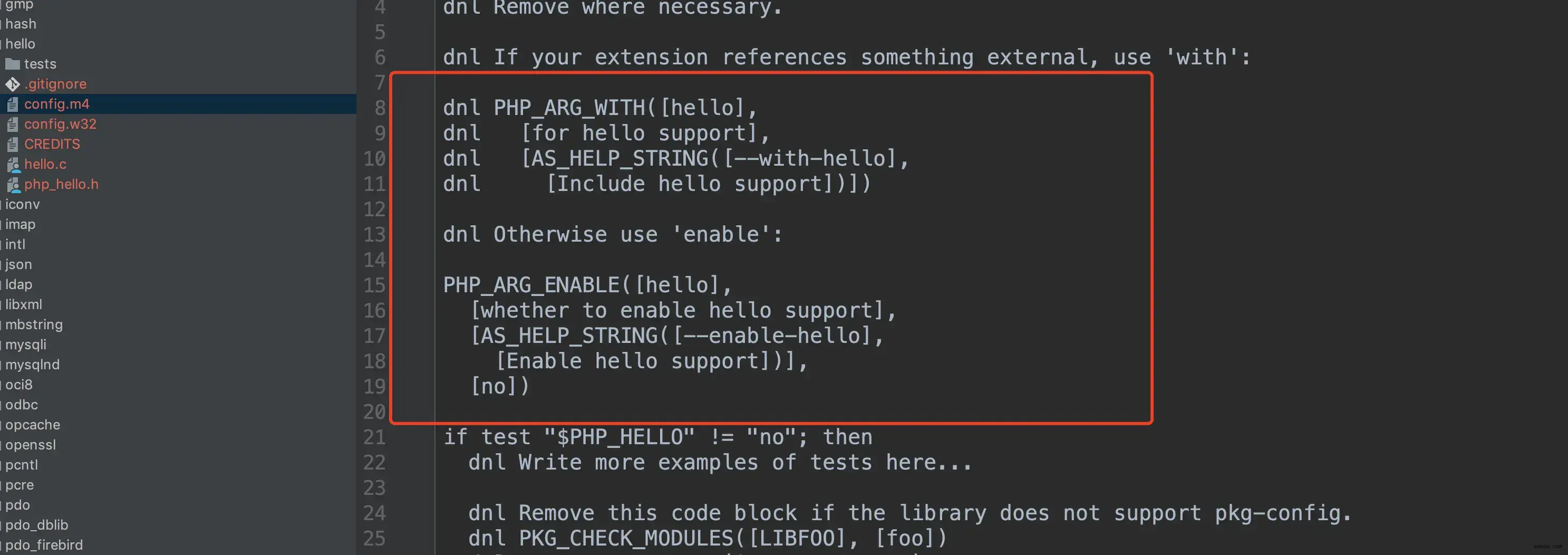This article is based on PHP7.4 and explains how to create a PHP extension from scratch. This article will explain the basic steps to create an extension. In the example, we will implement the following functionality.
Output content:
Implement a hello method in the extension to output hello word! after calling the hello method.
Generating the extension archetype
First we need to have a copy of php-src.
You can see that there is an ext_skel.php file.
|
|
This file is already distributed with php, so we can customize it very easily.
|
|
The hello directory is created in the ext directory.
Extended Archetype Description
|
|
-
config.m4 configuration file
The extended
config.m4file tells theUNIXbuild system which extensionconfigureoptions are supported, which extension libraries you need, and which source files to compile as part of it. For all frequently usedautoconfmacros, includingPHPspecific andautoconfbuilt-in ones.The purpose of
config.m4is to generateconfigurefiles in conjunction with thephpizeutility. Theconfigurefile is used for environment testing. It checks if the environment required for the extension to compile and run is met. Now let’s start modifying theconfig.m4file.
where
dnlis a comment symbol.The above code says that if you write an extension that depends on other extensions or
liblibraries, you need to uncomment thePHP_ARG_WITHrelated code. Otherwise, remove the comments from thePHP_ARG_ENABLErelated code snippet. We write extensions that do not depend on other extensions andliblibraries. Therefore, we remove the comment beforePHP_ARG_ENABLE.The above image is generated with the specification that it does not depend on other extensions.
-
php_hello.h header file Similar to the C header file, it contains some custom structures and function declarations, which need not be changed in this
demofor now. -
hello.c code file
The real logic code is in this file.
Write the code
hello.c is all logic code inside, so we just add code to operate in this file.
Understanding the extension entry
The entry point for the entire extension is the zend_module_entry structure, the specific definition can be seen in the zend_modules.h file in the Zend directory, there are a dozen attributes, quick skip, we only need hello for now.
|
|
Extension-related properties description:
- STANDARD_MODULE_HEADER helps us to implement the first 6 properties
- hello is the name of the extension
- hello_functions is the set of all methods contained in the extension, followed by 5 macros for each of the 5 extension-specific methods
- PHP_HELLO_VERSION is the version number of the extension, defined in the header file, so if you need to change it, just open
php_hello.hand finddefine PHP_LZPAY_VERSION. - STANDARD_MODULE_PROPERTIES does the rest of the properties for us
In the hello_functions[] method array there are already 2 example methods hello_test1 and hello_test2, we refer to them to write our methods, first we write a test method and put it after the function PHP_FUNCTION(hello_test2).
Then add our newly written functions to the hello_functions[] array.
![hello_functions[] array](https://cdn.jsdelivr.net/gh/b0xt/sobyte-images/2022/04/18/31d2699404d24593941894063d9d11c1.png)
Compile and install
Since I have a new standalone installation of php7.4, I’m basically operating with absolute paths. If you have one environment, then just do it directly.
|
|
Once installed, let’s configure the extension.
- ext-hello.ini
Testing
